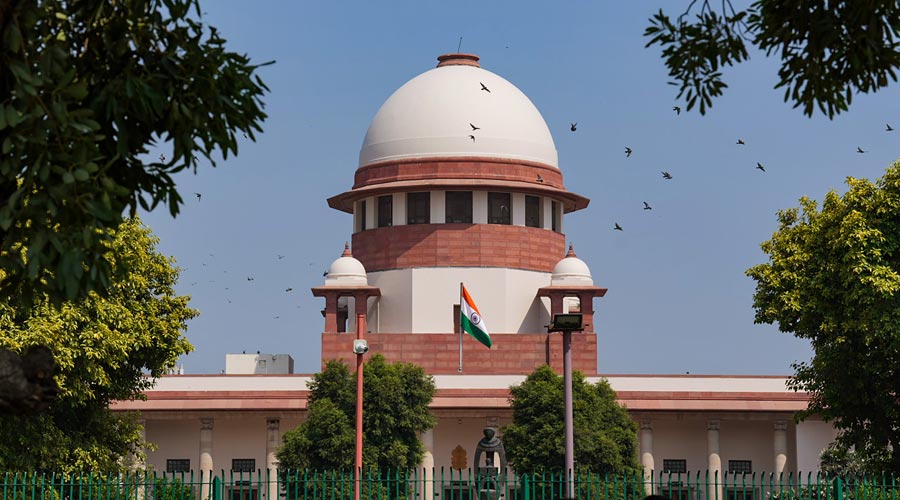Nithyakalyani Narayanan. V
On December 6th, the Supreme Court ruled that under the “group of companies” doctrine, non-signatories to an arbitration agreement may still be bound by it – “The ‘group of companies’ doctrine must be retained in the Indian arbitration jurisprudence considering its utility in determining the intention of the parties in the context of complex transactions involving multiple parties and multiple agreements”.
A Constitution Bench comprising Chief Justice DY Chandrachud, Justice Hrishikesh Roy, Justice PS Narasimha, Justice JB Pardiwala and Justice Manoj Misra delivered the judgment. According to the Court’s ruling, the arbitration agreement does not always bind its signatories exclusively. If there is a clear legal relationship between the signatories and the non-signatories and the parties meant to be bound by it by their action, then the requirement of a formal arbitration agreement does not imply that the non-signatories will not be bound by it.
CJI DY Chandrachud stated- “The signature of party in agreement is the most profound expression of consent of person to submit to jurisdiction. However, the corollary that persons who have not signed aren’t part of agreement may not always be correct.”
The Apex Court ruled that non-signatories are not completely unfamiliar with the arbitration agreement due to their contact with the signatory parties and their commercial engagement in the dispute.
The following are the rulings reached by Chief Justice DY Chandrachud’s judgement:
- The definition of parties under Section 2(1)(h) read with Section 7 of the Arbitration and Conciliation Act 1996 includes both signatory and non-signatory parties.
- Non-signatories’ actions may indicate that they agree to be legally bound by the arbitration agreement.
- The requirement of a written arbitration agreement under Section 7 does not exclude the possibility of binding non-signatory parties.
- Parties as defined by the Arbitration Act are not the same as parties “claiming through or under” a party to an arbitration agreement.
- Preserving the corporate separateness of the group of companies while ascertaining the shared intention of the parties to bind non-signatories to the arbitration agreement forms the fundamental premise for the application of the “group of companies” doctrine.
- The group of companies’ doctrine cannot be used on the premise of “alter ego” or “piercing the corporate veil.”
- Section 2(1)(h) and Section 7 of the Arbitration Act, when read harmoniously, give rise to the concept of a “group of companies”, which exists independently as a legal basis.
- To apply the ‘group of companies’ doctrine, the courts or tribunals have to consider all the cumulative factors as laid down in Discover Enterprises. Resultantly, the principle of a single economic unit cannot be the sole basis for invoking the group of companies doctrine.
- The claimants “through or under” are limited to stating their rights in a derivative capacity.
- In Chloro Controls India Pvt. Limited v. Seven Trent Water Purification Inc., the ruling that “non-signatories” can be bound by using the phrase “parties claiming through or under” is incorrect because it binds successors-in-interest of parties in a derivative capacity.
- The ‘group of companies’ doctrine must be retained in the Indian arbitration jurisprudence considering its utility in determining the intention of the parties in the context of complex transactions involving multiple parties and multiple agreements.
- At the referral stage, the referring court must leave it to the Arbitral Tribunal to decide whether non-signatories are bound by the arbitration agreement.
Justice Narasimha wrote a different but concurring opinion.
After observing that some aspects of the “group of companies” doctrine required reconsideration and casting doubt on the ruling in Chloro Controls India Pvt. Limited v. Seven Trent Water Purification Inc. and subsequent decisions, a three-judge bench led by then Chief Justice NV Ramana in May 2022 referred the matter to a larger bench.
The group of companies’ doctrine can be applied to bind a third party to arbitration where there is a tight corporate group structure that constitutes a single economic reality, as was noted in Mahanagar Telephone Nigam Ltd. v. Canara Bank, (2020) 12 SCC 767. This was mentioned in an application that Cox and Kings Ltd. (CKL) submitted under Section 11 of the Arbitration Act, asking for the appointment of arbitration in an international commercial arbitration concerning a dispute involving SAP India Private Ltd. The question was whether SAPIPL’s German parent company could be bound by arbitration.
The referring bench noted that the group of companies’ doctrine must be applied with caution and the mere fact that a non-signatory is a member of a group affiliated companies will not be sufficient to claim an extension of the arbitration agreement to the non-signatory. Declaring that the Chloro Controls ratio is based more on practicality than on the right application of the law, the Court referred the question of how to interpret “claiming through or under” as it appears in the amended Section 8 of the Arbitration Act in relation to the group of companies’ doctrine to a larger bench.
Name of the case: Cox and Kings Ltd v. SAP India Pvt Ltd ARBIT. PETITION No. 38/2020
Bench: Chief Justice DY Chandrachud, Justice Hrishikesh Roy, Justice PS Narasimha, Justice JB Pardiwala and Justice Manoj Misra.

